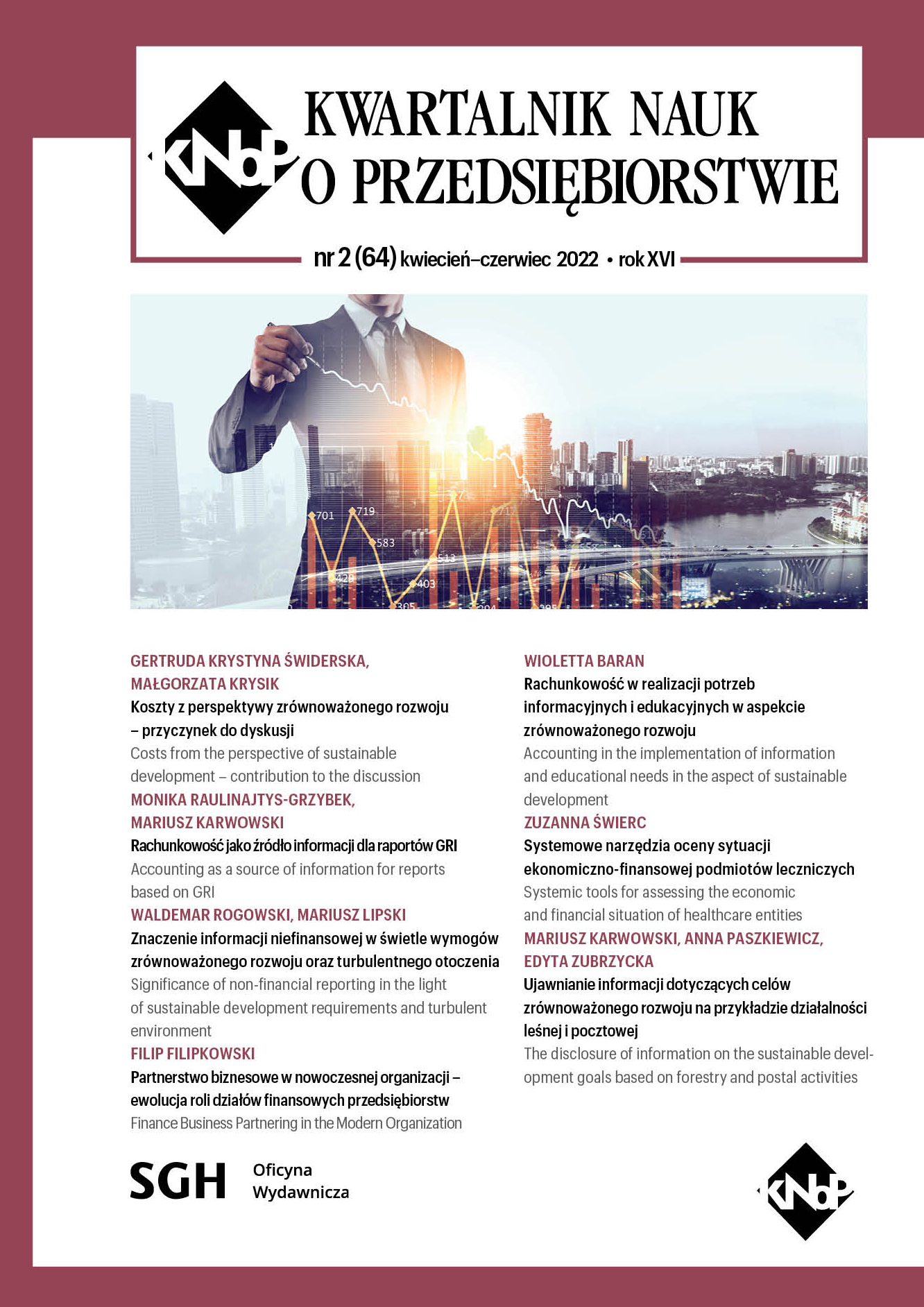Abstrakt
Zrównoważony rozwój jest coraz częściej uwzględniany w raportach przedsiębiorstw. W ten sposób uzyskuje się transparentność, umożliwiając interesariuszom ocenę takiej działalności oraz problemów z nią związanych. Zawartość raportów zrównoważonego rozwoju, sporządzonych według GRI, wykracza poza informacje tradycyjnie gromadzone i przetwarzane przez system rachunkowości. Celem artykułu jest weryfikacja, jakie źródła danych wykorzystywane są do sporządzenia raportów GRI, ze szczególnym uwzględnieniem rachunkowości. Badaniem objęto sześć raportów przygotowanych zgodnie z tymi standardami. Badanie obejmowało krytyczną analizę treści tych raportów. W trakcie badania wyodrębniono dane, dla których rachunkowość jest systemem, gdzie są one gromadzone i dalej przetwarzane, oraz dane, które są gromadzone w innych systemach informacyjnych przedsiębiorstwa, a następnie przetwarzane w systemie rachunkowości. Niniejszy artykuł stanowi jeden z pierwszych pogłębionych przeglądów wykorzystania informacji pochodzących z rachunkowości w raportach zrównoważonego rozwoju. Wyniki można uznać za interesujące dla praktyków i naukowców zajmujących się tego rodzaju raportowaniem.
Full Text
Bibliografia
Andrew J., Baker M. (2020), Corporate social responsibility reporting: the last 40 years and a path to sharing future insight, “Abacus”, 56 (1), s. 35–65, doi:10.1111/abac.12181.
Błach J. (2013), Raportowanie CSR jako element relacji inwestorskich przedsiębiorstwa, „Prace Naukowe Uniwersytetu Ekonomicznego we Wrocławiu”, 311, s. 11–19.
Cho C. H., Bohr K., Choi T. J., Partridge K., Shah J. M., Swierszcz A. (2020), Advancing sustainability reporting in Canada: 2019 report on progress, „Accounting Perspetives”, 19 (3), s. 181–204, doi: 10.1111/1911-3838.1223.
Chodyński A. (2016), Kreowanie odpowiedzialnego biznesu, Oficyna Wydawnicza AFM, Kraków.
Czaja-Cieszyńska H. (2018), Standardy GRI – kierunek dla raportowania na rzecz zrównoważonego rozwoju w organizacjach pozarządowych w Polsce, „Studia i Prace Kolegium Zarządzania i Finansów”, 164, s. 49–61.
Dyduch J. (2018), Raportowanie środowiskowe według wytycznych GRI w przedsiębiorstwie The Dow Chemical Company, „Prace Naukowe Uniwersytetu Ekonomicznego we Wrocławiu”, 532, s. 85–95, doi:10.15611/pn.2018.532.08.
Gabrusewicz T. (2011), Rola systemu współczesnej rachunkowości w teorii zrównoważonego rozwoju, „Zeszyty Naukowe Uniwersytet Ekonomiczny w Poznaniu”, s. 174, 28–37.
Gokten S., Ozerhan, Gokten P. O. (2020), The historical development of sustainability reporting: a periodic approach, „Zeszyty Teoretyczne Rachunkowości”, 107 (163), s. 99–117, doi:10.5604/01.3001.0014.2466. GRI (2016), The GRI sustainability reporting standards, Global Reporting Initiative, https://www.globalreporting.org/how-to-use-the-gri-standards/gri-standards-english-language/ (dostęp:22.02.2022). GRI (2022), Our mission and history, https://www.globalreporting.org/about-gri/mission-history/(dostęp: 22.02.2022).
Guthrie J., Farneti F. (2008), GRI sustainability reporting by Australian public sector organizations, “Public Money and Management”, 28 (6), s. 361–366, doi:10.1111/j.1467-9302.2008.00670.x.
Hummel K., Jobst D. (2021), The current state and future of corporate sustainability reporting regulations in the European Union, https://ssrn.com/abstract=3978478 (dostęp 07.02.2022).
Karwowski M., Raulinajtys-Grzybek M., Chróstny T. (2020), Zastosowanie standardów GRI 2016 w polskich przedsiębiorstwach, „Zeszyty Teoretyczne Rachunkowości”, 108 (164), s. 61–87, doi: 10.5604/01.3001.0014.3596.
Marcinkowska M. (2012), Rachunkowość społeczna – czyli o pomiarze wyników przedsiębiorstw w kontekście oczekiwań interesariuszy, „Prace Naukowe Uniwersytetu Ekonomicznego we Wrocławiu”, 271, s. 502–525.
Rogowski W., Łabęcki M. (2016), Ocena jakości informacji zawartych w raportach społecznych spółek wchodzących w skład indeksu RESPECT, „Organizacja i Kierowanie”, 1 (171), s. 113–130, doi:10.5604/ 01.3001.0009.8027.
Sikacz H. (2018), Wskaźniki ekonomiczne w raportach zintegrowanych wybranych grup kapitałowych – wyniki badań, „Studia Oeconomica Posnaniensia”, 6 (8), s. 35–53, doi:10.18559/SOEP.2018.2.3.
Świetla K. (2017), Charakterystyka umów dotyczących poziomu usług oraz kluczowych wskaźników efektywności w praktyce outsourcingu procesów rachunkowości, „Zeszyty Naukowe Uniwersytet Ekonomiczny w Krakowie”, 12 (972), s. 57–68.
Szadziewska A. (2013), Rola rachunkowości w pomiarze efektywności działań CSR, „Zarządzanie i Finanse”, 4 (4), s. 257–277.
Szczypa P. (2014), Współczesne wyzwania rachunkowości przedsiębiorstw w gospodarce zrównoważonego rozwoju, „Prace Naukowe Uniwersytetu Ekonomicznego we Wrocławiu”, 329, s. 282–290, doi:10.15611/pn.2014.329.30.
Zaleska M. (2012), Ocena kondycji finansowej przedsiębiorstwa przez analityka bankowego, John Wiley & Sons, Inc.
Zyznarska-Dworczak B. (2015), Wiarygodność raportowania zintegrowanego w świetle strategiczno-informacyjnego paradygmatu rachunkowości, „Studia Oeconomica Posnaniensia”, 3 (1), s. 191–204.
Żabski Ł. (2019), Cele zarządcze w umowach o świadczenie usług w zakresie zarządzania spółkami komunalnymi, „Studia Prawno-Ekonomiczne”, CX, s. 333–347.
Autor
Autor (Autorzy) artykułu oświadcza, że przesłane opracowanie nie narusza praw autorskich osób trzecich. Wyraża zgodę na poddanie artykułu procedurze recenzji oraz dokonanie zmian redakcyjnych. Przenosi nieodpłatnie na Oficynę Wydawniczą SGH autorskie prawa majątkowe do utworu na polach eksploatacji wymienionych w art. 50 Ustawy z dnia 4 lutego 1994 r. o prawie autorskim i prawach pokrewnych – pod warunkiem, że praca została zaakceptowana do publikacji i opublikowana.
Oficyna Wydawnicza SGH posiada autorskie prawa majątkowe do wszystkich treści czasopisma. Zamieszczenie tekstu artykuły w repozytorium, na stronie domowej autora lub na innej stronie jest dozwolone o ile nie wiąże się z pozyskiwaniem korzyści majątkowych, a tekst wyposażony będzie w informacje źródłowe (w tym również tytuł, rok, numer i adres internetowy czasopisma).
Osoby zainteresowane komercyjnym wykorzystaniem zawartości czasopisma proszone są o kontakt z Redakcją.

